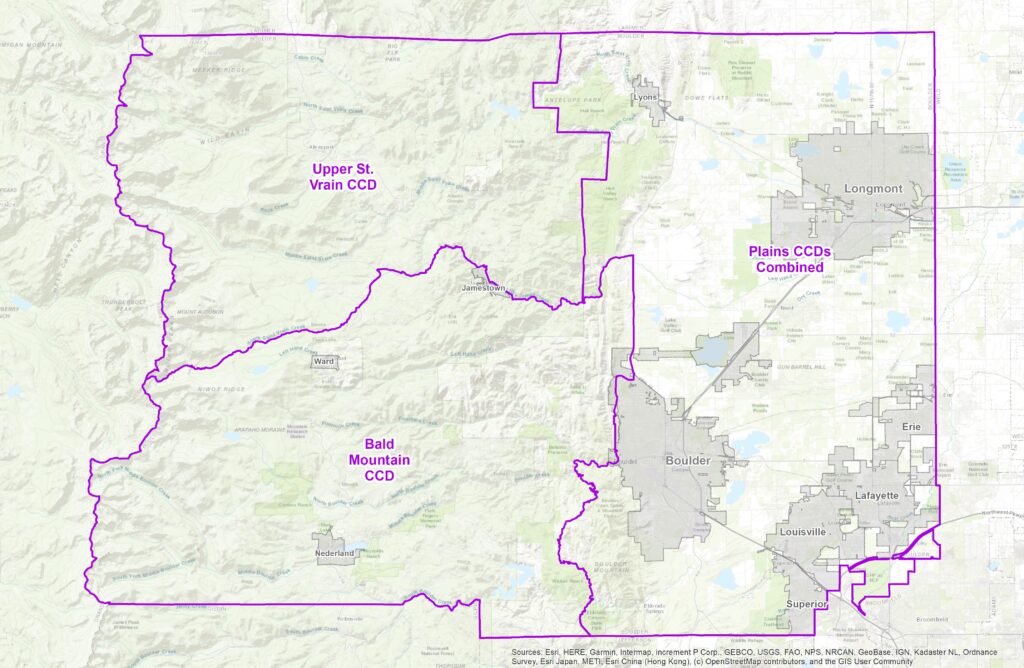Background
Boulder County updated Land Use Code regulations related to Short-Term Dwelling and Vacation Rentals in 2021. The final text amendments were signed by the Board of County Commissioners (BOCC) on January 5, 2021, and became effective February 7, 2021.
Licensing for short-term rentals began on March 1, 2021 and compliance and outreach began in March 2022. The required review was initiated in August 2022. Staff presented an initial review of land use applications for short-term rentals to the Board of County Commissioners (BOCC) and Planning Commission on October 19, 2022. View the staff presentation and supporting documents.
According to the approval Resolution 2020-104, the efficacy of the Land Use Code amendment must be reviewed within two years of adoption, but no sooner than one year following full implementation. In accordance with this requirement, staff established criteria and metrics for review. The criteria include:
- Existing short-term and vacation rental regulations in the Land Use Code meet the intent of policymakers, decision-makers have sufficient guidance to make decisions, and existing levels of review are appropriate;
- Existing licensing requirements are appropriate, verifiable, and promote desired safety standards;
- Proactive enforcement to achieve compliance with Land Use Code and licensing ordinance.
The metrics, which will help staff measure progress on achieving the above criteria, are both qualitative and quantitative. Qualitative metrics include a review of best practices, land use applications for short-term rentals, the licensing requirements, and enforcement efforts to date. Quantitative metrics include statistics about land use reviews, licenses issued, code compliance, and monitoring efforts supported by the county’s third-party vendor.
Determine which process and license is right for you
Staff are currently in the process of updating this webpage to implement the regulations passed by the Board of County Commissioners in January of 2024. This webpage will continue to be updated.
Licensing
A local license issued by Boulder County Community Planning & Permitting is required to operate any Short-Term Rental in unincorporated Boulder County. A Short-Term Rental (such as VRBO or Airbnb) is a rental that is offered to a single booking party for a rental duration of fewer than 30 days at a time. Boulder County does not issue licenses for the incorporated towns and cities (e.g., Boulder, Nederland) located in Boulder County.
Determine which process and license is right for you
There are two types of Short-Term Dwelling Rental Licenses depending on the type of rental property the owner wants to operate:
- A Short-Term Rental License is required for:
- Primary Dwelling Short-Term Rental – A single-family dwelling unit offering lodging accommodations to a single booking party at a time within that dwelling unit for a rental duration of fewer than 30 days where the dwelling unit is the primary residence of the owner.
- Secondary Dwelling Short-Term Rental – A single-family dwelling unit offering lodging accommodations to a single booking party at a time within that dwelling unit for a rental duration of fewer than 30 days where:
- The dwelling unit is not the primary residence of the owner;
- The dwelling unit is rented 60 days per year or less; and
- The dwelling unit is rented with a two-night stay minimum.
- A Vacation Rental License is required for:
- Vacation Rental* – A single-family dwelling unit offering lodging accommodations to a single booking party at a time within that dwelling unit for a rental duration of fewer than 30 days where:
- The dwelling unit is not the primary residence of the owner; and
- The dwelling unit is rented more than 60 days per year.
*Please note: Vacation Rentals are allowed in the F, A, RR, and MI zoning districts provided they are on unsubdivided land. In other words, Vacation Rentals are not allowed in subdivisions. You may Ask a Planner if you are unsure whether you are in a Subdivision. Vacation Rentals are also allowed in B, Cl, LI, and GI zoning districts.
Property owners who would like to have a Secondary Dwelling Short-Term Rental or a Vacation Rental will need to go through the appropriate review and approval process as required by and outlined in the Boulder County Land Use Code (Articles 4-507 and 4-516, see Resolution 2020-104) prior to being eligible to apply for a Short-Term Dwelling Rental License. Property owners who have received approval to run a Short-Term Rental prior to February 8, 2021 and are operating within the terms of that approval will not need to go through an additional land use review process but will still need to apply for a license.
Please use this tool to help determine which process and license is right for you.
Boulder County Short-Term Dwelling Rental Licensing Regulations
Fees
- Short-Term Rental License (Primary and Secondary Dwelling Short-Term Rentals): $200.00 initially, $175.00 renewal
- Vacation Rental License (Vacation Rentals): $300.00 initially, $275.00 renewal
A $50.00 discount is given on renewals when there are no confirmed violations during the License Period (of two years).
Application and Application Checklists
Application Checklists to review as you prepare the materials you will need for the online application:
Guidelines For Rental Properties



